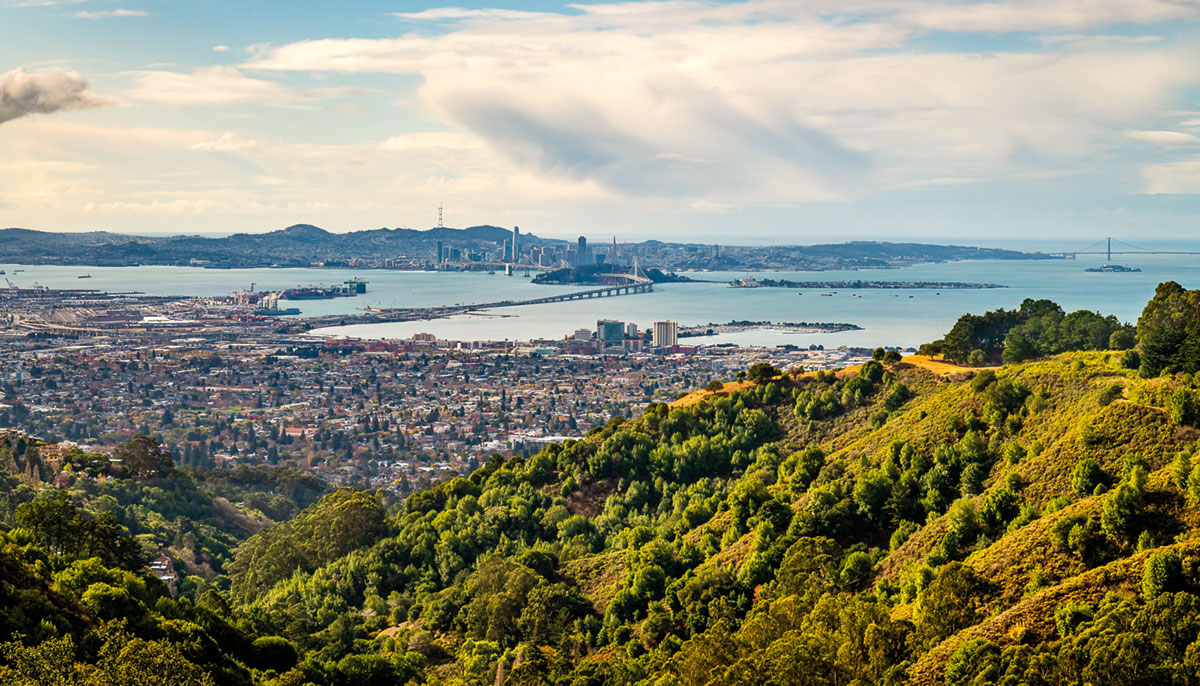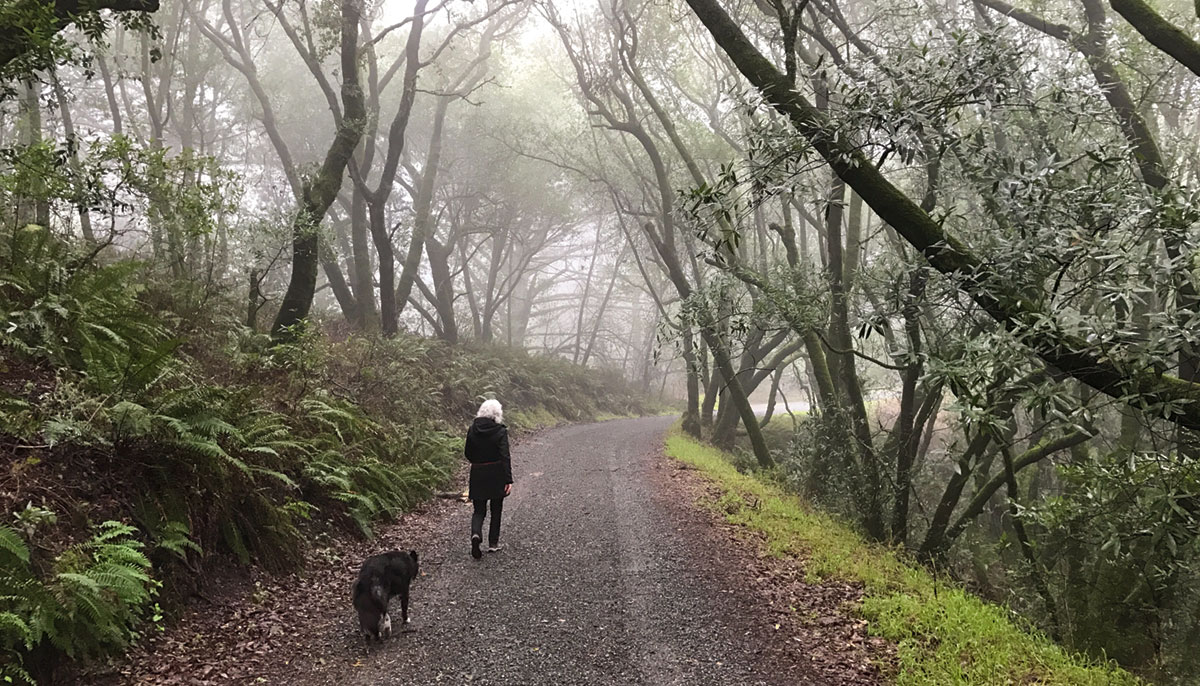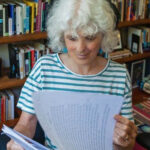As I hike in Berkeley’s Tilden Park with my friend Lucy, I am reciting a Buddhist verse to myself, its singsong melody following the crunch of our hiking boots and the tap-tap-tap-tap of our walking poles.
All things are impermanent.
They arise and they pass away.
To live in harmony with this truth
Brings great happiness.
I’ve been repeating these words to myself ever since I first heard them five years ago. I don’t completely “get” the meaning. But chanting them over and over awakens something deep in my chest that I long to know, or perhaps once knew.
Lucy and I met twenty-six years ago when our daughters were in preschool. As we hike, masked and six feet apart, we share the rich silence of old friends. When we talk, our conversation zigzags across the span of our lives.
I couldn’t bring myself to sit down and meditate on a cushion. So I meditated with my feet on these trails.
“Lulu!” I exclaim, “How can our world have turned so crazy upside down?” As usual, we share news of the girls. Both of them were at the epicenter at the start of the pandemic, Queens and Jersey City. We check on each other’s health. “How are you?” Lucy asks, “How’s Patrick?” As the virus spreads in California, my husband, Patrick, and I, and Lucy too, are in our seventies and among those particularly at risk.
To live in harmony with this truth
When I first knew Lucy, I was recovering from breast cancer, panicked I might die young, leaving my five-year-old Caitlin without a mother. I couldn’t bring myself to sit down and meditate on a cushion. So I meditated with my feet on these trails.
Today, after walking a bit without talking, Lucy and I review recent events—fires burning across the West Coast, millions of Americans infected by the coronavirus, hundreds of thousands dead.
Brings great happiness
The chant returns unbidden, but something feels wrong. Happiness? No! Not now. Surely not happiness at this time of mass death and suffering. The word happiness suggests cheerfulness or booming gladness. That “happiness” line has come increasingly to rankle me. Surely living in harmony with all this impermanence does not bring happiness. Could it be an inaccurate translation?
I learned the chant early one morning years ago when my houseguest Meg, a Vipassana teacher, joined me to meditate next to my favorite statue of Guanyin, the Goddess of Compassion. Meg recited this modern adaptation of a celebrated verse from the Pali canon, which is said to have been spoken at the time of the Buddha’s passing. She sang the last line in long drawn out bass notes.
Silently singing it today with the same echoing cadence, I ask myself with particular vehemence: Why happiness? What about heartbreak?
Sometimes I think I understand the chant, then realize I don’t.
Just a year ago, I relied on this chant as my mother lay dying in her New York apartment. She was ninety-nine, and I sensed she was ready to go. I chanted under my breath as she dozed in the bed we’d set up in her living room for her wordless goodbyes. Each time the verses rippled through me, I felt somehow more peaceful, more attuned to the currents of change.
After a week of dozing, my mother’s eyes suddenly blinked open. She looked straight into my face. “Hello,” I said. Stunning me, she replied, “Hello!” Then eyelids fluttered closed. Bursting open again, her eyes tuned to mine. “Hello!” A lilt in her voice. Eyelids lowered. Then, pop, again wide open. “Hello!” Robust with delight. Eyes closed.
I started to laugh. She’d reminded me of what I so often forget. The continuum of birth, death, birth, death, birth. Impermanence moment to moment.
Hello. Hello. Hello.
As Lucy and I walk, the sun breaks through clouds. Golden grasses shiver in the breeze. When the pandemic began, the grasses along these trails shimmered with crimson-tipped seed tassels, and on pine boughs, each branch tip sprouted a bud, a new green candle. Now the dry grasses are dying, yet seeding next year’s spring. I sense the grace of the cycle.
A memory returns of chanting silently at the crematory when my sister and I released our mother’s body into the fire. And, yes, beneath grief, maybe I touched something in the realm of happiness, a grace or ease.
But how can I carry a sense of ease to the Covid deaths or the injustices they reveal? All over the world, mostly poor people, mostly black and brown people, are struggling to breathe, dying in pain from this virus.
Like rinsing laundry in a coursing stream, I run my questions through the rhythms of the verse.
Interrupting my reverie, a runner suddenly charges onto the blacktop from a dirt side path. He’s a young man in his prime, muscled and sweaty. Breathing hard, he passes us, then begins to circle as if winding down. Lucy and I jump to the left, then to the right, trying to get out of his way, and to keep our essential six feet. We can’t figure out which way he’s going. But he keeps circling. Is he circling us?
“Excuse me ladies,” he shouts. “Mind if I ask you a question?”
Is there something off about him? Or maybe he’s just lost.
“Sure,” says Lucy.
He comes to a standstill about ten feet from us. Then he blurts out, “What do you do about a broken heart?”
Whoa. Did he really say that?
I hear my own voice speaking before I’m sure what’s happening. “Grieve,” I’m saying, “You’ve really got to grieve.”
Here we are a few miles out on the trail, two seasoned women launching into an intimate exchange with a young man we’ve never seen before. I doubt this would ever have happened in normal times.
“I can’t tell you how often I’ve had a broken heart,” says Lucy.
“Me neither,” I tell him, my hand on my chest.
“Not that hearing about our heartbreak makes yours less painful,” says Lucy. A pause as a whole family of walkers weaves around and passes us.
“Don’t know if you are able to cry,” I hazard.
“Oh, I’ve done a lot of that.” Interlacing his fingers, he stretches his arms, palms toward the sky. “Every day.” He says it softly, but I hear a shiver in his voice.
“She wasn’t ready,” he tells us. “She had a lot more to learn about herself.” A pause. “I do too.”
The sun is reaching its midday zenith. Lucy and I step into the shade of a live oak on our side of the path and the young man into the shade of another live oak on his side. We suggest a range of things “to do”: journal, meditate, exercise.
He’s done them all.
“Time,” says Lucy. “In the end, it will take a lot of time.”
“Yeah,” he says. “It’s just that I’m cooped up in a little apartment, by myself. I don’t know if I can bear it.”
Confined and alone, could he be suicidal? I look into his face, high cheekbones, bright eyes above his mask. “You can,” I say. I do believe he’ll be okay. How many times have I felt that I couldn’t bear the heartbreak, but here I am still hiking strong. He’s doing everything: tears, running, meditating. Time—he’ll have to endure.
He pauses, and it seems we’re saying goodbye. Shuffling feet. He turns in his direction, we in ours.
“I know, I know.” He takes me by surprise. “All things are impermanent.”
He’s the one who says it.
Lucy and I walk on, passing through a eucalyptus grove. Acorns scrunch and snap beneath our feet. I’m grateful for the cool shadow of these shaggy trees. “We were quick to advise,” I say.
And Lucy: “I wish we’d listened more, let him talk.”
Lucy turns off the blacktop onto a side path, saying, “I have a new trail surprise to show you. Follow me.”
Now we walk single file. I enjoy the quiet, thinking my own thoughts.
So important to be listened to, and to listen—like Guanyin listens to the cries of the world. Also crucial to listen to our own cries.
I remember a line from Oscar Wilde, heard from the Buddhist teacher Jack Kornfield when I was in my early thirties. “Hearts are made to be broken.”
Moved, I looked up the source. It was an impassioned letter Wilde wrote from his prison cell. The whole sentence reads: “The most terrible feature of life in prison is not that it breaks one’s heart—hearts are made to be broken—but that it turns one’s heart to stone.”
Heartbreak. I can’t stop thinking about it. What would I like to say to that young man? Or to myself?
I am heartbroken in countless ways, like others in our suffering world. It’s hard to recognize our lives. “What do you do about a broken heart?” the young man asked. I tell myself: Respect it. Take it from Oscar Wilde. What would be most terrible is for your heart to turn to stone. To deny, distract, numb out.
Better to listen. I listen now with my feet, note the grit of dirt through my boots. Pebbles, matted grasses, decaying needles, the changes in uneven ground.
They arise and they pass away.
The last stretch to the top demands all my energy. Sweating in the heat, I stumble over potholes and jagged rocks, slip on scree. Breathing hard now through my mask, I begin to feel faint. A rising fear—maybe I’ve got the damn virus. I imagine myself trapped in a ventilator, unable to breathe, dying alone, cut off from my family. Honing my meditative discipline, I tune back in to sensation—my glutes, my calves.
Suddenly the view opens. No trees, only sky. At the crest of the climb, a low circle of rocks encloses a stone viewing platform. Stepping onto the platform, I can see in all directions.
“Lulu!” I cry out.
“My surprise for you.” Lucy graciously extends her arm, welcoming me, then sits down on the rock wall and gazes out at the East Bay.

Standing nearby, I turn slowly around to see San Francisco, the Golden Gate Bridge, Mount Tamalpais, the Richmond Bridge, the hills of Tilden Park. Rising in the distance, Mount Diablo faces Mount Tamalpais. The mess of thoughts and feelings clears in the sight of this vast impermanence. I imagine the formation of the bay, once a wide plain through which river waters from the Sierra mountains exited into the sea. I cast my imagination further back to the buckling of the land, as a great oceanic plate slid under the continental plate, thrusting up the hills of San Francisco and the East Bay where we’ve been hiking.
How different is this great splitting of the earth from the cracking of a heart?
I plant my feet and slightly bend my knees to find stability. Just stand here in stillness, with a broken heart, raw with pain. Hold steady and take note. There is only change—from great shifts through the millennia, to plagues and pandemics, to passing moments. None of them belongs to anyone. I feel an upwelling of love for this mutable world, a wish to tend it with care.
Having sat with both parents and friends as they died, having birthed Caitlin and accompanied the birthing of others, I know that in birth and death we enter a region outside time and space. It’s where I rest now. No conditions, only ease. Can I call it happiness? No one can truly name these things.
Hello. Hello. Hello.

